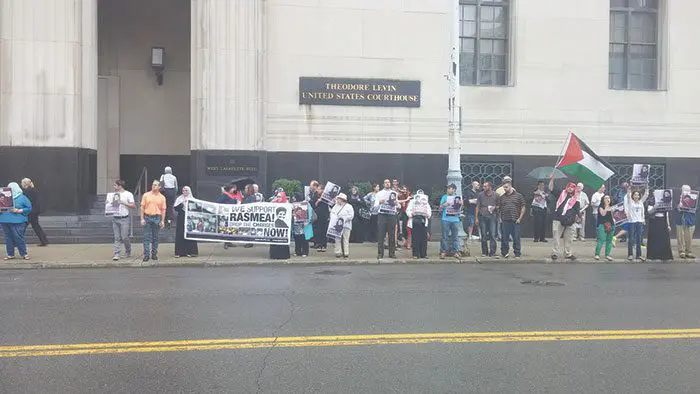
DETROIT — A federal judge denied the motion to dismiss the indictment against Rasmea Odeh, a Palestinian American woman accused of lying on her naturalization application about a conviction in an Israeli military court decades ago.
The defense demanded the judge drop the charges because the investigation of Odeh was selective and related to her political activism.
In 2010, the FBI raided the homes of 23 political activists, including Hatem Abudayyeh, the executive director of the Arab American Action Network, where Odeh is employed. The activists were ordered to appear in front of a grand jury. Nobody was indicted.
Odeh’s supporters say the indictment, which they describe as a political witch hunt, is related to the unconstitutional investigation of the activists.
Michael Deutsch, Odeh’s lead attorney, said he was disappointed “on some level” that the judge denied dismissing the charges, but he added that the decision was expected.
Deutsch explained that he had to prove that the indictment— not just the investigation— was discriminatory and selective, which is difficult. Proving the indictment selective would require showing that other people who have false information on their naturalization form have not been prosecuted.
Nevertheless, the defense attorney wanted the judge to hear about the political background of the case.
Another motion that was discussed on Thursday was the defense request for allowing a psychological expert to testify in front of the jury when the trial starts. Odeh’s supporters say that she was tortured in Israeli prisons and suffers Post-Traumatic Stress Disorder from the abuse.
The psychological expert would testify to her condition and whether or not her state of mind could have affected her answers on the citizenship application.
Deutsch told U.S. District Judge Gershwin A. Drain that Odeh’s indictment requires the prosecution to prove “specific intent” in the charges leveled against Odeh— that she lied on her application for the specific intent of deceiving the government to become a U.S. citizen.
The defense attorney cited a precedent from the 6th District Court, where the ruling says that the defendant has to have “willfully” misrepresented the facts to obtain citizenship.
The prosecutor argued that Odeh faces “general intent” charges— the mere notion in that she misrepresented the facts, regardless of why, makes her guilty. According to the prosecution, the psychological expert testimony in this case would be irrelevant.
Deutsch told the judge that the psychological evaluation is “essential” to Odeh’s defense.
After the hearing, he told The Arab American News that the defense would be in a difficult situation if the judge does not allow the expert to testify.
A protest by Odeh’s supporters in front of the federal courthouse in Detroit preceded the hearing. Demonstrators demanded dropping the charges against Odeh.






Leave a Reply